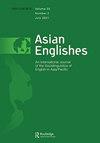Perceiving and problematizing ‘invisibility’ in English language education and criticality: a duoethnographic dialogue
IF 1.8
Q1 LINGUISTICS
引用次数: 0
Abstract
ABSTRACT The dominant social, political and educational narrative of ‘homogeneous Japan’ has been both perpetuated and challenged inside Japan and abroad. Transdisciplinary scholarship and critical communal voices have highlighted Japan’s history as a site of diversity and complexity. the diverse ways people negotiate being, becoming and belonging as ‘Japanese’ and/or as members of Japanese society, and the marginalization individuals and groups have faced due to the homogeneity narrative. This article presents two researcher-practitioners employing duoethnographic inquiry to dialogue regarding how critical frameworks in applied linguistics and English language teaching (ELT) seek to account for identity negotiation, experience and (in)equity in Japanese society, and ELT therein. In sharing, probing, reflecting on and reimagining their stories dialogically, the authors discuss one key concern: in limiting their scope to addressing ‘essentialized and idealized nativeness in English’ dominant approaches to criticality have rendered individuals’ broader negotiations of identity and community membership, ‘invisible.’ The authors invite readers to engage with the dialogue herein, and reflect on what frames their own ‘seeing.’英语语言教育与批判性中“不可见性”的感知与问题化:多民族志对话
本文章由计算机程序翻译,如有差异,请以英文原文为准。
求助全文
约1分钟内获得全文
求助全文
来源期刊

Asian Englishes
LINGUISTICS-
CiteScore
3.30
自引率
18.80%
发文量
34
期刊介绍:
Asian Englishes seeks to publish the best papers dealing with various issues involved in the diffusion of English and its diversification in Asia and the Pacific. It aims to promote better understanding of the nature of English and the role which it plays in the linguistic repertoire of those who live and work in Asia, both intra- and internationally, and in spoken and written form. The journal particularly highlights such themes as: 1.Varieties of English in Asia – Including their divergence & convergence (phonetics, phonology, prosody, vocabulary, syntax, semantics, pragmatics, discourse, rhetoric) 2.ELT and English proficiency testing vis-a-vis English variation and international use of English 3.English as a language of international and intercultural communication in Asia 4.English-language journalism, literature, and other media 5.Social roles and functions of English in Asian countries 6.Multicultural English and mutual intelligibility 7.Language policy and language planning 8.Impact of English on other Asian languages 9.English-knowing bi- and multilingualism 10.English-medium education 11.Relevance of new paradigms, such as English as a Lingua Franca, to Asian contexts. 12.The depth of penetration, use in various domains, and future direction of English in (the development of) Asian Societies.
 求助内容:
求助内容: 应助结果提醒方式:
应助结果提醒方式:


